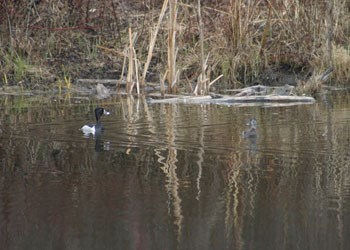By Kathy Morrell
"The new - and the new all over again." By my count, this is the seventh year the YFBTA has organized a "full-fledged" Birding Symposium. Yes, seven years - it seems unbelievable.
The event actually had its origins at the 2005 Annual General Meeting when members decided that dull business did not correspond to the culture of those who call themselves birders.
Birders are, after all, social creatures who like to flock together to talk and learn more about the avian world. And so was hatched the idea of an AGM that included a speaker and a good meal. As a result of this idea, the YFBTA invited Alan Smith as the group's first guest speaker.
This year, Alan Smith is back, evidence of the new all over again. His presentation is entitled Birding by Ear. Smith is a firm believer that learning to identify birds by ear is important, especially, he says, in the northern forests of Saskatchewan. There, the birds hide out in the trees, where the only way to make an identification is by song.
If you think you know the name, Alan Smith, you're probably right. Smith is the man of the Christmas Bird Count, the one to whom we send our bird statistics after a day in the winter cold. He worked for the Canadian Wildlife Service for more than 30 years. He is the author of the Atlas of Saskatchewan Birds and a founding member and supporter of the Last Mountain Bird Observatory. He is a meticulous scientist and a committed naturalist.
The second speaker at the 2013 Symposium who fits our category of the new all over again is Anna Leighton. Leighton came to Yorkton in 2005 to promote her book, Prairie Phoenix. Co-authored with Bonnie Lawrence, Prairie Phoenix describes in photo and text Saskatchewan's floral emblem, the Western Red Lily.
This year, Leighton's presentation will tell the story of John Richardson and his travels through the North with the Franklin Expedition. In his journals, Richardson documented the plants the Cree used in their daily lives and described how the First Nations people saved the explorer and his party from starvation. Leighton's presentation mingles the botany of the scientist and the history of two cultures in the North American wilderness. It promises to be a captivating story.
Merle Massie is an environmental historian. What an intriguing and different combination - the environment and the history of the province. And yet, we in the YFBTA know it's a fit. In this third presentation, Massie will add to the YFBTA's expanded cultural focus with her presentation on the 1930s migration of farmers from southern Saskatchewan to the north where the area was less severely impacted by drought.
Lorne Scott is a Saskatchewan farmer and environmental activist. His talk, the fourth at the 2013 Symposium, will focus on two areas of concern to conservationists: the transfer of the federal government's responsibility for land management of the PFRA pastures to the province and the closure of the PFRA Tree Nursery at Indian Head. Environmentalists see the pastures and the nursery (as they exist presently) as tremendously advantageous to the protection of grasslands habitat and wildlife.
Scott brings a life time of commitment to the presentation he will give. His interest in nature began at the age of fifteen when he built and erected bluebird houses along the roadways near his home town of Indian Head. He has been a leader in numerous environmental and wildlife organizations: Nature Saskatchewan, the Saskatchewan Wildlife Federation and the Whooping Crane Con-servation Association. He was the chairperson of the Stop Rafferty-Alameda Project. That group took the federal government to court and won a ground-breaking decision that forced the federal government to follow the required legislation for environmental assessment.
In 1991, Scott was elected as MLA for the Constituency of Indian Head. He was later appointed Minister of the Environment and Resource Management. During his political career, his work pushed forward two important initiatives: the addition of 1.5 million acres of Crown land to the Wildlife Habitat Protection Act and measures to preserve critical natural areas in all of Saskatchewan's eco-regions.
Scott has won numerous awards for his work in conservation and on the environment. Those credentials will bring to his presentation the credibility needed for a controversial topic. Scott's language is civil; his approach is persuasive - two essential components given an issue that has received such a lot of media attention in the past year.
The Symposium promises to provide diverse educational opportunities as well as a lunch, a supper and an after-dinner presenter. You can find out more and you can register by visiting The YFBTA website www.yfbta.com (you will find a poster and a registration form) or by contacting Martha Karau at 306 - 896 - 2660. The Symposium will be held in Churchbridge, April 13.




